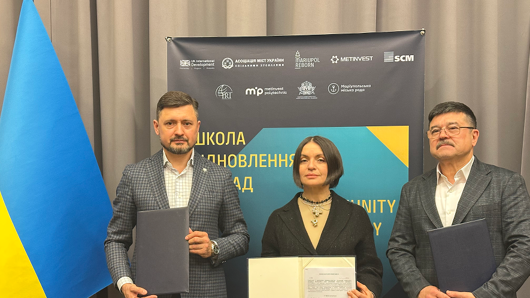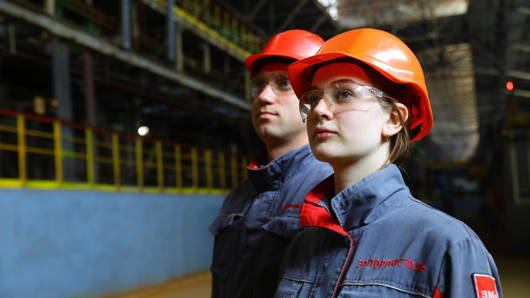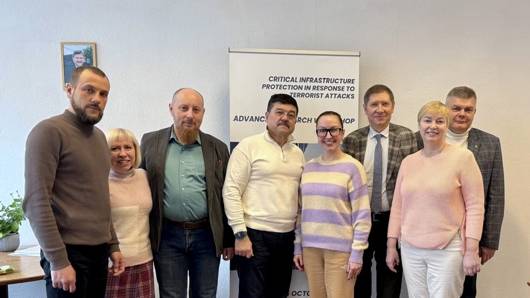In June, Metinvest Politechnic, a private technical university founded by Metinvest Group, celebrates its 5th anniversary. Head of the Department of Education Quality Management and Accreditation of the University, Konstantin Moiseenko, in an interview with UAprom, spoke about the experience of work, trends in technical education and the peculiarities of engaging students to engineering majors.
"Metinvest Politechnic already has two master's degrees, and this year the first graduation of bachelors is expected. How is university education organized now?"
"We combine distance education with face-to-face laboratory training sessions at enterprises. The students learn how to work with equipment, gain practical knowledge from specialists and get acquainted with work processes. The university offers more than 20 accredited programs – from professional pre-higher education to postgraduate studies. Our priority is engineering education. And even those programs that cannot be called engineering – management or economics – are focused on business processes and management features in industrial business."
"In Ukraine, there is an understanding of the need to apply more modern approaches to the training of specialists, to adapt educational spaces and program content to the needs of the economy. These priorities are also discussed in the government. What standards do you adhere to and what modern approaches do you implement?"
"We create laboratories at enterprises. For example, in cooperation with the Kamet Steel plant, we opened an automation laboratory equipped with equipment from Siemens and ABB. It is unique in Ukraine, as it combines equipment from several suppliers and allows conducting training not only for students, but also for the staff of the relevant enterprises.
In the educational process, we also use the English-language electronic library Cortext, thanks to which students and teachers have access to modern technical literature. In addition, instead of traditional academic mobility, we are developing the area of business internships, including at industry enterprises abroad.
We have already organized a trip of a group of students to Promet Steel in Bulgaria, and on June 2, a new group of masters went on a month-long internship at Danieli, one of the leading manufacturers of metallurgical equipment in the world. The students will get acquainted with the company's technical and technological solutions, as well as the best practices for their application. In addition, they will learn how the production culture is formed, because the program includes excursions to the factories of European companies that use Danieli equipment."
"How do you choose students to participate in these programs?"
"The selection takes place on a competitive basis. We pay attention to the background of candidates, professional training, sometimes even work experience. Knowledge of technical English is essential. We also ask students to record a video in which they talk about themselves and what value the internship will have for them as professionals in the future. We believe that such internships are more useful for those who study in master's programs, since it is already at the forefront of the profession."
"What are the results of the internships? Do they have a practical embodiment?"
"Yes, usually an internship is an element of a diploma project, within which our masters develop specific recommendations for business implementation. We also have other formats that help to put the developments into practice. For example, our students took part in the "Plant Games" competition within the Metinvest Group. It is an initiative where teams of students from different universities develop solutions to real-world production problems. The Metinvest Politechnic team took first place this year, and now our energy saving project is being implemented at Zaporizhstal."
"Do you plan to deepen cooperation with business in this area?"
"In fact, businesses often underestimate the possibilities of education and science in solving their operational, technological or production problems. At Metinvest Politechnic, we develop this area and cooperate with enterprises that have very specific requests. For example, such as reducing the wear of grinding balls during ore beneficiation. In such cases, we form a team, which includes students of master's programs, who, together with the company's specialists, work to find solutions. Involving students in this process is an important tool that ensures the effectiveness of education. The problem-based approach is a trend in modern education. This format of work also makes it possible to adapt educational programs in accordance with the new knowledge gained."
"So Metinvest Politechnic, in addition to education, also performs an R&D function for business?"
"Yes, not every business can afford to have its own R&D centre. In this case, outsourcing is the way that allows you to solve a production problem and optimize costs. In the structure of Metinvest, the Politechnic is gradually becoming, perhaps, the main R&D division. Although this does not exclude any research, innovation, modernization or improvement that is implemented in the operational activities of enterprises and does not even require the involvement of the Politechnic."
"Do companies outside the Metinvest Group contact you?"
"This practice is very isolated. As I understand it, there are fears that the results of the research will become known to Metinvest. However, despite the fact that it is the main stakeholder of the university, we are still an independent organization that adheres to academic freedom and academic ethics."
"How do you look at the government initiative Science City? Will it be able to become an effective tool for attracting investment and developing science?"
"We did not join the discussion of this initiative. Although it is worth noting that any attempts that will help combine science and practice and help scientific and educational organisations find their place in the market have the right to life.
In general, the idea of science parks, the sharing of scientific infrastructure, which is at the heart of this initiative, is not new. However, it is important how it will be implemented in terms of legal and economic support. Science requires significant funding, so it is impossible to achieve a mass appearance of science parks. But if we see two or three effective examples, they can become the basis for it to work on a larger scale in the future.
If there is support from the state, even in the form of competitive funding of grants, then this is one way to engage potential residents of Science City. The other is business. If entrepreneurs see that education and science in Ukraine have the potential for useful utilisation or obtaining specific results, they will also get involved."
"An admission campaign is currently expected. How do you engage applicants, who do you target, and how do you adjust your strategy taking into account significant migration and negative demographic forecasts?"
"In addition to negative demographic trends, we are also faced with the fact that people are not very aware of engineering professions and their benefits. Often the profession of an engineer is considered unnecessary. Therefore, we are actively working with school students in this direction. At the same time, we see potential in the adult audience, which, in conditions of limited human resources, can find themselves in engineering.
In the context of a competitive educational market and changes in the demands of employers, who are increasingly looking not for a diploma, but for a set of skills and knowledge, we offer flexible learning formats. Knowledge can be acquired both through degree education (bachelor's, master's) and through microcredit programs. This is a global trend – such models are used, in particular, by Microsoft with the Credentials platform, which allows you to obtain micro-qualifications by taking appropriate courses.
Now we are trying to communicate with the audience and sell our microprograms related to soft skills, occupational safety, etc. And already having a connection with a person who came to the microcredit program, you can offer him training in broader degree programs. We also plan to divide large degree programs into separate modules that allow you to study individual topics or gain specific skills. This format also follows the concept of lifelong education.
Finally, Metinvest Politechnic does not set itself the goal of having 30 thousand students. Now we have a little more than 700 students. And our goal is 1,200 students in each course."
"And what does the employers' market look like now? What are their requests? How did the war and the destruction of industrial enterprises affect the demand for engineering majors?"
"People who see prospects in the engineering business, which creates means of production or technologies for other industries, are sensitive to risks. And we must admit that in a situation of prolonged uncertainty, such a business, especially a small one, will leave Ukraine. However, there is also the opposite trend: On an increasingly free field, it will become easier to compete and benefit. Therefore, those who are not afraid of certain risks will continue to develop in Ukraine even in the face of a military threat, as is happening, for example, in Israel.
Our university has a mining and metallurgical profile, so we train specialists for this field. At the same time, we have students from non-industrial regions who enter our university because they are interested in the management and organization of industrial enterprises in general. Therefore, we hope to scale our profile program "Management of Modernization of a Metallurgical Enterprise" by adapting it to other industries: mining, robotics, industrial automation, etc.
Together with Dnipro Politechnic, we are also working on a project of agreed diplomas. In this way, we will be able to provide a common engineering basis, and an individual educational trajectory will be formed by the institution that best specializes in a certain field – mining, metallurgy, mechanical engineering, railway transport, production of equipment or drones."
"By the way, do you plan to develop educational programs in the field of MilTech, train specialists for the needs of defense enterprises?"
"We are engaged in certain research and developments in this area, but I will not comment on them. I would also like to note that now this area is concentrated in a network of small manufacturers who have a very narrow specialization, knowledge and skills necessary for this purpose. Due to these small scales, they are not very noticeable in terms of the development of technology and production.
In educational programs, we introduce separate modules, for example, geological mapping or the use of special equipment, including for security purposes."
"What is the current situation with engineering education in Ukraine?"
"Little by little, interest in engineering majors is reviving. Metinvest Politechnic was created as a means of preserving and developing engineering schools. And now we see that, for example, the Kyiv School of Economics is also beginning to enter this market. Moreover, they, like us, develop technical education from professional pre-higher education. This is the basis on which the entire vertical framework could be created in the future.
The demand for quality engineering education is growing. People understand that the engineering profession provides an opportunity to earn good money. Part of the interest is related to the development of military production, in particular the design, operation and repair of drones.
The attitude of parents and children to technical majors is also changing under the influence of social networks, which are often a source of information about the success of technology startups. It helps popularize engineering. I believe that it would be useful for Ukraine to have its own program to popularize the exact and natural sciences, starting from school."








